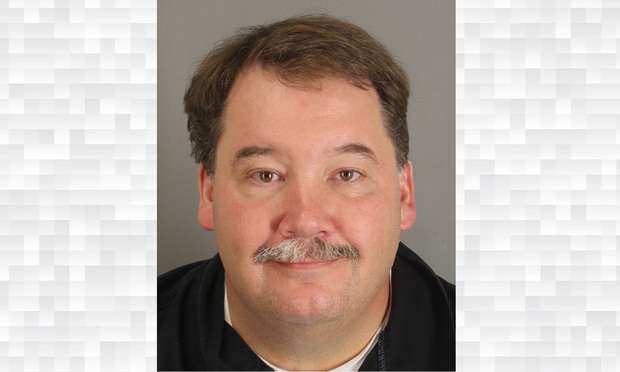Attorney Facing Discipline Over Collected Fees for Fake Work Resigns Law License
A Beaumont lawyer who forged court orders and billed and collected fees for fabricated work has resigned his law license instead of facing attorney discipline.
January 30, 2018 at 03:34 PM
5 minute read

A Beaumont lawyer who served jail time for forging court orders and faced an attorney discipline case for billing and collecting fees for fabricated work has resigned his law license.
Kenneth L. “Leigh” Parker Jr.'s resignation as a lawyer resolves an attorney discipline case connected with Parker's representation of a Beaumont surgeon in five cases related to a business divorce and closure of a surgical practice. Parker was paid more than $150,000 for his work.
Parker pleaded guilty in August 2017 to tampering with governmental documents, a state jail felony. His sentence was 180 days in state jail, five years of probation and restitution of $150,000 to the doctor.
His sentence was reduced to 90 days of straight time, said Marcus McLellan, public information officer for the Jefferson County Sheriff's Office. Parker served the sentence at the Jefferson County Correctional Facility and was released on Dec. 27, 2017, said McLellan.
Parker scanned the signatures of two district judges and put the forged signatures onto legal documents, according to a Beaumont Enterprise article about Parker's indictment. He forged the documents so that he could misrepresent the outcome of the case, which had been dismissed.
No one answered a call to Parker's law office, nor a cellphone listed in public records.
Lawyer resignation
In December 2017, Parker filed a motion with the Texas Supreme Court to resign as a lawyer, and the high court accepted his resignation on Jan. 23. The Commission for Lawyer Discipline filed a response to Parker's motion, which contains much of the background of the case.
One underlying 2014 lawsuit pitted the doctor against a bank that issued the mortgage for the closed surgical practice, the response said. The doctor and his former partner had split the $250,000 business loan, however, the bank got a judgment against the doctor for the full amount. Parker made the doctor think he was negotiating a mortgage payoff. The doctor paid $180,000 to the bank and received a release of lien. Although the doctor thought the matter was resolved, the bank kept demanding more money. The doctor paid an additional $21,000 but refused a subsequent demand for $60,000. Finally, the doctor learned that Parker had forged court documents and also the release of lien. Parker had been fabricating his negotiations with the bank.
Parker also forged court orders and had the doctor pay him for fabricated work in a second matter against another bank, according to the response. The doctor had a $700,000 summary judgment against him and his wages were being garnished to collect it. Parker made the doctor think he won sanctions in the case, and even gave the doctor a fraudulent personal check for nearly $268,000—supposedly it was garnished funds, recovered by the court. Parker told the doctor to attend scheduled hearings, which never even occurred, and would make the doctor wait outside as Parker supposedly met with opposing counsel and the judge.
In another case, the response said that a community hospital in Beaumont terminated the doctor's employment without cause, and he sued. The doctor's first attorney withdrew, and the doctor hired Parker to file a new suit because the community hospital had reported him to the Texas Medical Board for being unavailable on call, even though he had given notice. The medical board case was dismissed. The community hospital also reported the doctor to the National Practitioner Data Bank, and Parker filed temporary restraining orders to remove that report. Parker lead the doctor to think he had won monetary damages. Later, the doctor found that Parker had fabricated work on the case and billed him for it.
A fourth matter involved the doctor's wrongful eviction, said the response, which happened in the wake of his partnership breakup. The doctor's lawyer withdrew, and he hired Parker to file a new suit. Parker led him to think the case was progressing, when in reality, the case had been dismissed for want of prosecution. However, Parker was still billing and collecting for ongoing activities.
The same pattern of fabricating work and billing for it, lying to the client about the case, and forging court orders was also present in a final case that Parker handled for the doctor.
The response noted that Parker's conduct violated multiple rules in the Texas Disciplinary Rules of Professional Conduct. Parker violated rules that required him to hold client funds, separate from his own, in a trust account with safeguards and accounting records; created a duty, when representation was terminated, to surrender client papers and return unearned fees, among other things; prohibited him from committing a serious crime, or any crime that reflected poorly on his honesty, trustworthiness or fitness; and barred him from engaging in dishonest, fraudulent, deceitful or misrepresentative conduct.
If Parker is ever reinstated to practice law, he must pay the $150,000 restitution in the criminal case. Also, he must pay $1,000 in attorney fees to the Commission for Lawyer Discipline for the attorney discipline lawsuit it filed against him.
Parker earned his law degree in 1995 from Baylor University School of Law in Waco, and he was licensed to practice law in Texas that same year. He practiced at the Law Offices of Leigh Parker in Beaumont. Parker faced public discipline once in the past, as well, serving a fully probated suspension from Aug. 1, 2013, to Oct. 31, 2013, according to his State Bar of Texas attorney profile.
Claire Mock, spokeswoman for the State Bar of Texas Office of Chief Disciplinary Counsel, didn't immediately return a call seeking comment.
Angela Morris is a freelance journalist. Follow her on Twitter at @AmorrisReports.
Correction: An editing error in an earlier version of this story misstated the cause for Parker's jail time.
This content has been archived. It is available through our partners, LexisNexis® and Bloomberg Law.
To view this content, please continue to their sites.
Not a Lexis Subscriber?
Subscribe Now
Not a Bloomberg Law Subscriber?
Subscribe Now
NOT FOR REPRINT
© 2025 ALM Global, LLC, All Rights Reserved. Request academic re-use from www.copyright.com. All other uses, submit a request to [email protected]. For more information visit Asset & Logo Licensing.
You Might Like
View All
Read the Document: DOJ Releases Ex-Special Counsel's Report Explaining Trump Prosecutions
3 minute read
Houston Trial Lawyer Mary-Olga Lovett Leaves King & Spalding to Open Boutique
3 minute read
The Gospel According to Paxton? AG Fights Religious Group Over Migrants
6 minute read
Trending Stories
- 1Snapshot Judgement: The Case Against Illustrated Indictments
- 2Texas Supreme Court Grapples Over Fifth Circuit Question on State Usury Law
- 3Exploring the Opportunities and Risks for Generative AI and Corporate Databases: An Introduction
- 4Farella Elevates First Female Firmwide Managing Partners
- 5Family Court 2024 Roundup: Part I
Who Got The Work
J. Brugh Lower of Gibbons has entered an appearance for industrial equipment supplier Devco Corporation in a pending trademark infringement lawsuit. The suit, accusing the defendant of selling knock-off Graco products, was filed Dec. 18 in New Jersey District Court by Rivkin Radler on behalf of Graco Inc. and Graco Minnesota. The case, assigned to U.S. District Judge Zahid N. Quraishi, is 3:24-cv-11294, Graco Inc. et al v. Devco Corporation.
Who Got The Work
Rebecca Maller-Stein and Kent A. Yalowitz of Arnold & Porter Kaye Scholer have entered their appearances for Hanaco Venture Capital and its executives, Lior Prosor and David Frankel, in a pending securities lawsuit. The action, filed on Dec. 24 in New York Southern District Court by Zell, Aron & Co. on behalf of Goldeneye Advisors, accuses the defendants of negligently and fraudulently managing the plaintiff's $1 million investment. The case, assigned to U.S. District Judge Vernon S. Broderick, is 1:24-cv-09918, Goldeneye Advisors, LLC v. Hanaco Venture Capital, Ltd. et al.
Who Got The Work
Attorneys from A&O Shearman has stepped in as defense counsel for Toronto-Dominion Bank and other defendants in a pending securities class action. The suit, filed Dec. 11 in New York Southern District Court by Bleichmar Fonti & Auld, accuses the defendants of concealing the bank's 'pervasive' deficiencies in regards to its compliance with the Bank Secrecy Act and the quality of its anti-money laundering controls. The case, assigned to U.S. District Judge Arun Subramanian, is 1:24-cv-09445, Gonzalez v. The Toronto-Dominion Bank et al.
Who Got The Work
Crown Castle International, a Pennsylvania company providing shared communications infrastructure, has turned to Luke D. Wolf of Gordon Rees Scully Mansukhani to fend off a pending breach-of-contract lawsuit. The court action, filed Nov. 25 in Michigan Eastern District Court by Hooper Hathaway PC on behalf of The Town Residences LLC, accuses Crown Castle of failing to transfer approximately $30,000 in utility payments from T-Mobile in breach of a roof-top lease and assignment agreement. The case, assigned to U.S. District Judge Susan K. Declercq, is 2:24-cv-13131, The Town Residences LLC v. T-Mobile US, Inc. et al.
Who Got The Work
Wilfred P. Coronato and Daniel M. Schwartz of McCarter & English have stepped in as defense counsel to Electrolux Home Products Inc. in a pending product liability lawsuit. The court action, filed Nov. 26 in New York Eastern District Court by Poulos Lopiccolo PC and Nagel Rice LLP on behalf of David Stern, alleges that the defendant's refrigerators’ drawers and shelving repeatedly break and fall apart within months after purchase. The case, assigned to U.S. District Judge Joan M. Azrack, is 2:24-cv-08204, Stern v. Electrolux Home Products, Inc.
Featured Firms
Law Offices of Gary Martin Hays & Associates, P.C.
(470) 294-1674
Law Offices of Mark E. Salomone
(857) 444-6468
Smith & Hassler
(713) 739-1250






